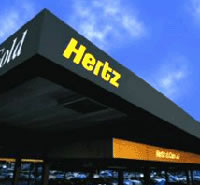With a fleet of 12 Model T Fords, Walter Jacobs opened in Chicago in 1918 the rental business that was to become Hertz, now the world's biggest car-hire firm. In 1923, Jacobs sold his pioneering business to John Hertz. It was the first in a long series of ownership changes that continued this week with the announcement that Ford Motor Company, the main owner of Hertz since 1985, is to sell it to a consortium of three private-equity firms in a deal worth $15 billion in debt and equity.
This is arguably the biggest private-equity deal since the controversial purchase of RJR Nabisco for $25 billion in 1989. But it is unlikely to remain the biggest for long. Private-equity firms (which buy large, influential stakes in firms, often taking public companies private) have been raising huge sums from investors, they are increasingly willing to bid together on deals and borrowing money is currently cheap and easy-Hertz's buyers, for example, are borrowing over $12 billion. Indeed, some fear that private-equity firms are now so flush with cash that they are overpaying for firms coming onto the market.
To win Hertz, the consortium of Clayton, Dubilier & Rice (CDR), the Carlyle Group and Merrill Lynch Global Private Equity had to see off a rival private-equity consortium and Ford's original plan to spin off the car-rental firm through an initial public offering (IPO) of its shares. With its core carmaking business in trouble, Ford needs the money-and an IPO would have struggled to offload even 20% of the firm's shares, compared with the 100% that Ford is now selling to private equity.
Some industry analysts view the sale as a sign of a welcome increase in the urgency of Ford's efforts to solve its problems. Ford has also just reshuffled its top management, notably promoting Mark Fields to head its North American operations. Mr Fields promptly underscored Ford's difficulties this week by saying that its Jaguar luxury-car business may not return to profitability by 2007 after all.
But the sale is about more than Ford's need for money. Carmakers no longer see much added value in owning a rental business; and rental firms see little synergy in being owned by a carmaker. A captive rental firm used to be seen by big carmakers as a valuable source of demand for their cars, especially for those models that were hard to sell to anyone else. Before linking up with Ford-first, in 1965, via a joint-advertising deal-Hertz was owned from 1926 to 1953 by General Motors (which later bought a stake in Avis and then sold it in 1996). But the growing pressure on carmakers for better financial performance has reduced the appeal of selling lots of cars cheaply to high-volume buyers such as hire firms. Lately, the prices they charge hire firms have been rising. At the same time, the car-rental market, once mostly a collection of local monopolies, has become highly competitive. Rental firms-some of which have had financial troubles of late-can no longer afford to be a dumping ground for a carmaker's unwanted stock.
Hertz's new owners believe they can improve profit margins if demand remains strong, which it should as long as nothing dents air-traffic volumes (much of the rental firms' business is done at airports). Improving profits will largely be a job for CDR, which is still rare among private-equity firms in having many partners with experience of running, and improving, big firms. George Tamke, a CDR veteran, will chair Hertz's board. A more recent CDR recruit, Jack Welch, the legendary former boss of General Electric, will chair thrice-yearly performance reviews. The biggest challenge for CDR may be to manage relations with the other members of its consortium. Until recently, CDR was sceptical about the viability of the increasingly fashionable private-equity consortium ("club") deals: Mr Welch last year dismissed them as "gang bangs". But, it seems, CDR now concedes that, partly because of the diversification rules governing private-equity funds, the only way to do really big deals is to join a club.




 By: N. Peter Kramer
By: N. Peter Kramer
